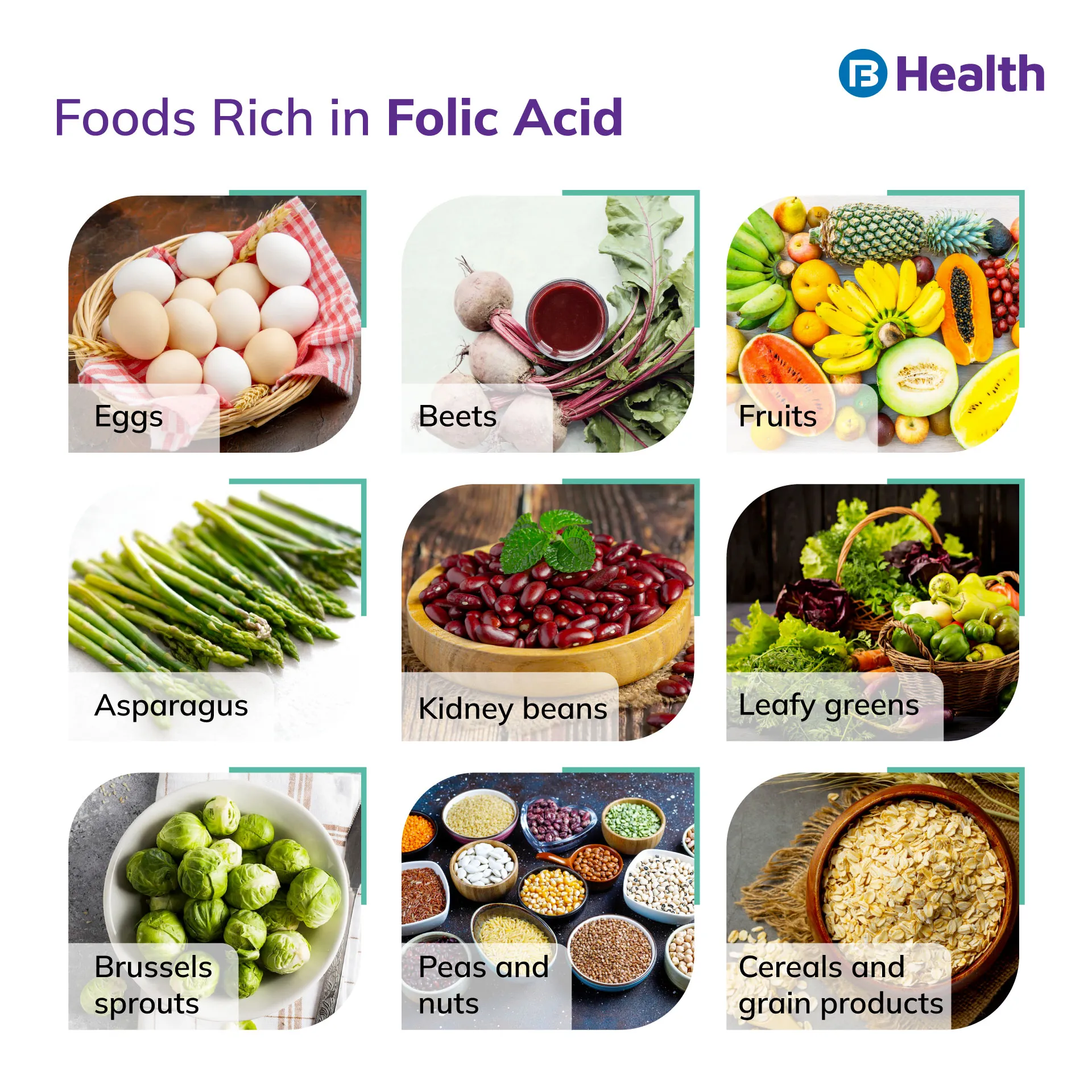Nutrition | 8 min read
Folic Acid: Benefits, Dosage, Risk Factor and Precautions
Medically reviewed by
Table of Content
Key Takeaways
- Folate deficiency during pregnancy is common in developing nations
- Benefits of folic acid include prevention of pregnancy complications
- Nausea, diarrhea, and irritability are some folic acid side effects
Folic acid is a form of water-soluble vitamin B9 mostly used to treat folic acid deficiency and some kinds of anemia. Folic acid uses helps in the body make new cells, prevent birth defects, pregnancy complications, and more [1].
Peas, lentils, beans, oranges, and spinach are some foods that are rich in folate. A folic acid is a man-made form of folate that is used in fortified foods and supplements. Your body requires folic acid through your diet as it cannot produce it on its own.
In an Indian study on pregnant women, folate deficiency was detected in 24% of women [2]. Folate deficiency during pregnancy is a matter of concern in developing nations. The deficiency of synthetic folic acid causes symptoms like extreme tiredness, lethargy, headaches, pale skin, and palpitations.
Read on to know the folic acid during pregnancy and the folic acid uses by men and women.
What is Folic Acid?
- Folic acid is a vitamin that is water soluble. It is a synthetic form of folate, which is a member of the B vitamins
- Because your body cannot produce folate, you must obtain it through your food
- Several foods contain folate naturally. Folic acid has been added to some foods. It can also be obtained through dietary supplements
Folic Acid Uses
Here are some folic acid uses you should note.
Great Source of Folate
Folic acid tablets benefit us by reducing folate deficiency. Inadequate dietary intake, pregnancy, excessive alcohol, surgery, and malabsorptive diseases are some causes that lead to this deficiency [3]. It can result in side effects such as anemia, birth defects, depression, mental impairment, and weakened immune function.
Folic Acid for Pregnancy Complications
Folate and folic acid supplements help prevent birth defects, particularly neural tube defects. So, these are suggested to women of reproductive age. It prevents preeclampsia and other pregnancy-related complications [4]. Folic acid uses is important in the development of the fetus too.
Improve Brain Health
Low folate levels in your blood are linked with reduced brain function and dementia. In fact, even normal but low levels of folate can lead to an increased risk of cognitive disorders in older adults [5]. It is said that folic acid supplements can help treat Alzheimer’s disease and improve brain function. Research suggests that folic acid may prevent the risk of epilepsy, depression, and neuropsychiatric disorders.
Lower the Risk of Heart Disease
Having high levels of homocysteine, an amino acid, is associated with medical conditions like heart disease and stroke. Having folic acid may contribute to the metabolism of homocysteine and thus reduce the risk of heart disease. Further, folic acid uses may reduce the risk of high blood pressure, a factor known to cause heart disease. Moreover, taking folic acid supplements improves blood flow that further improves cardiovascular health.
Folic Acid Benefits For Hair
Folic acid or vitamin B9 is known to improve the health of your nails, skin and hair. It promotes the growth of healthy hair. Besides, it supports the growth of the cells present in the tissues of your nails, hair, and skin. Folate or folic acid also helps in the proper functioning of the red blood cells in your body, which helps in preventing premature greying of hair.
Apart from the above-mentioned folic acid benefits, it also helps in improving blood sugar levels, improves fertility, reduces inflammation, lowers side effects of medications, and helps people with kidney disease.

Folic Acid Benefits
Some medical issues that may benefit from folic acid supplementation include:
Cure Diabetes
Supplemental folate may aid people with diabetes with better blood sugar control and lessen insulin resistance. You might require supplementation if your folate levels are low since the diabetic medication metformin can lower them.
Aid in Fertility Issues
Folate can enhance egg quality and aid in the growth and implantation of eggs in the uterus. If you take folate, the likelihood of becoming pregnant and bringing a fetus to term may rise. Larger consumption of supplementary folate may increase the likelihood of pregnancy in people who utilize assisted reproductive technologies.
Lower Inflammation
Inflammation is involved in many diseases. It has been demonstrated that supplemental folate and folic acid can lower inflammatory indicators like C-reactive protein.
Help With Kidney Disease
The kidneys normally filter waste from the blood. However, when they are injured, homocysteine can accumulate. Homocysteine levels in the blood are elevated in around 85% of people with chronic kidney disease. [1] Folic acid supplementation may help lower homocysteine levels and the risk of heart disease in those with kidney illness.
Larger studies are still required to validate the advantages of folate supplementation. People may take supplements containing folate for a variety of additional causes.
Side effects of Folic Acid
Consuming foods high in folate and supplementing with natural folates like 5-MTHF are generally regarded as safe practices. However, consuming excessive quantities of folic acid with supplements may result in the accumulation of unmetabolized folic acid in the blood.
The term "unmetabolized" indicates that the folic acid has not been broken down by your body or changed into another form of folate. There have been no recognized health hazards associated with unmetabolized folic acid. However, hidden risks may still exist.
Autism
- Folic acid consumption during pregnancy aids in preventing abnormalities of the neural tube. Yet, having a child with ASD may be more likely if you have high blood quantities of unmetabolized folic acid
- Unmetabolized folic acid levels are unlikely to be high in those who consume below 400 mcg of folic acid every day
- Elevated amounts of unmetabolized folic acid may impact the mental development of children during pregnancy
Some of the common folic acid side effects include the following.
- Nausea
- Diarrhea
- Irritability
- Stomach pain
- Bloating or gas
- Skin reactions
- Seizures
- Confusion
- Trouble concentrating
- Sleeping problems
- Depression
- Loss of appetite
- Feeling of excitement
- Behavioral changes
- Unpleasant or bitter taste in the mouth
Risk of Excessive Folic Acid Consumption
High folic acid intake may increase your risk of developing the following diseases:
Cancer
- Folic acid may decrease the risk of head and neck, pancreas, oesophageal, and bladder cancer. However, it may raise the danger of prostate cancer. Thus far, study on the subject has yielded inconclusive results, and additional studies are needed
- Yet, evidence indicates that folate might suppress certain types of cancer in their early stages, whereas excessive quantities of folic acid consumed once precancerous cells have formed may cause cancer to thrive and advance [2]
Immune System Dysfunction
Supplements containing high doses of folic acid can weaken the immune system by lowering the function of NK cells, which are protective immune cells. However, whether these immunological alterations put people at higher risk of infection is still unclear.

Precautions
- If you have any allergies, inform your physician or pharmacist before taking this medication. This product might contain inactive chemicals that trigger an allergic reaction or other issues. Consult your pharmacist for more details
- Inform your pharmacist or doctor about your medical history, particularly if you have vitamin B-12 deficiency (pernicious anaemia), before using this product
- Inform your dentist or doctor about all the products you consume before undergoing surgery (including herbal products and prescription and non-prescription drugs)
- When taken as recommended, folic acid is risk-free to take during pregnancy. It is a component of prenatal vitamin products. Consuming adequate folic acid during pregnancy may prevent some congenital disabilities of the spinal cord. Talk to your doctor for more details
- Even though folic acid enters breast milk, it is not likely to negatively impact a breastfeeding baby. Still, before breastfeeding, speak with your doctor
Right Dosage
- Most multivitamins, prenatal vitamins, and B complex vitamins contain folic acid but are also available as a supplement. Certain foods are additionally enriched with the vitamin in some countries
- Typically, folic acid supplementation is used to treat or prevent low blood folate levels. Moreover, they are usually taken by those who are expecting or intend to get pregnant to reduce the likelihood of birth abnormalities
- 400 mcg of folate is the Recommended Dietary Allowance or RDA for anyone over 14. Pregnant women should take 600 mcg, and nursing mothers should take 500 mcg. Typically, supplement doses fall between 400 and 800 mcg
- Folic acid supplements are available without a prescription. When taken in moderate doses, they are typically regarded as safe
- Yet, they may interfere with prescription drugs, such as those used to treat rheumatoid arthritis, parasite infections, and seizures. So, it is best to speak with a medical professional before consuming folic acid supplements if you are also taking other medications
For a complete list of side effects, get in touch with your general physician. Get immediate medical support if you experience allergic reactions including rash, itching, hives, redness, wheezing, breathing difficulties, and swelling of your face, throat, lips, and tongue. Avoid folic acid if you are allergic to it. Consult with your doctor if you have an infection, are alcoholic, have anemia, or have kidney disease before taking the folic acid tablets.
If you are pregnant or are breastfeeding, talk to your doctor. Your doctor may prescribe folic acid supplements along with other medications. Sometimes, folic acid may interact with other medications and cause certain side effects or complications. A folic acid dose of more than 1 mg per day may prove unsafe.
Additional Read: Neurological Conditions and SymptomsThe dosage of folic acid depends on your age, medical conditions, and other factors. So, you should consult with your physician for the right dosage. To know more about the folic acid tablets side effects and uses, book online consultation with doctors on Bajaj Finserv Health. This way, you can get the answers to personalized health queries including folic acid 5mg uses and benefits for yourself. Avail Bajaj Finserv Health card and Get Rs. 2,500 Lab & OPD benefit which can be used across pan India.
References
- https://medlineplus.gov/folicacid.html#:~:text=Folic%20acid%20is%20a%20B,her%20baby's%20brain%20or%20spine.
- https://www.nature.com/articles/s41430-018-0255-2#:~:text=Data%20on%20the%20prevalence%20of,and%20no%20nationally%20representative%20data,
- https://www.ncbi.nlm.nih.gov/books/NBK535377/
- https://www.ncbi.nlm.nih.gov/pmc/articles/PMC6283543/
- https://www.ncbi.nlm.nih.gov/pmc/articles/PMC6664218/
Disclaimer
Please note that this article is solely meant for informational purposes and Bajaj Finserv Health Limited (“BFHL”) does not shoulder any responsibility of the views/advice/information expressed/given by the writer/reviewer/originator. This article should not be considered as a substitute for any medical advice, diagnosis or treatment. Always consult with your trusted physician/qualified healthcare professional to evaluate your medical condition. The above article has been reviewed by a qualified doctor and BFHL is not responsible for any damages for any information or services provided by any third party.



